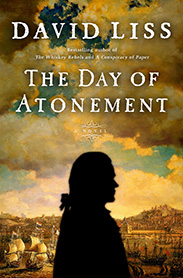The Day of Atonement, by David Liss, is set in 1755 Lisbon during the height of the Catholic Church's Inquisition. Englishman Sebastian Foxx has returned after fleeing Lisbon ten years earlier. Back then, he was thirteen year old Sebastião Reposa, a Portuguese boy whose parents were arrested by the Inquisition. A family friend whisks him off to England, where he is placed into the charge of Benjamin Weaver, a "thief-taker" (something like a private detective) whose adventures are detailed in some of Liss's earlier novels. Sebastião is brought up in Weaver's rough-and-tumble world of thieves and cutthroats, where he learns how to handle himself in tough situations.

Sebastião, now Sebastian Foxx, has returned to Lisbon posing as an ambitious English merchant, determined to exact revenge on the Inquisition's top priest, who is to blame for his parents' deaths. But he quickly discovers others who need his help. Old friends threatened by the Inquisition, the girl he loved as a child, and the man who took him to England ten years ago, who is now destitute because of swindle.
As Sebastian maneuvers to help his friends, and makes plans to kill the priest, he slowly discovers he is being manipulated by a web of lies. Friends turn out to be enemies, and visa versa. He must make atonement for wrongs he commits while acting on the lies, and figure out who can and cannot be trusted. At the climax, nature intervenes with a cataclysm that both frustrates and aids in his mission.
As usual, Liss's prose and historical research immerse the reader in the culture and era of 1755 Lisbon, making the story thoroughly believable. Sebastian Foxx is both a failure and hero at various points in his adventure, gullible to misinformation fed him, then cunning and ruthless when necessary to turn the tables. The reader can feel something is amiss, and that Foxx is being set up for a fall, but Liss keeps us guessing.
The book is 363 pages hardback, but is so engrossing it becomes a quick read you can't put down. I've read many other Liss books (see my earlier review of The Coffee Trader), and this one is as compelling as the others. Highly recommended.
No comments:
Post a Comment